
April 18
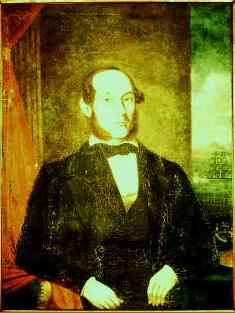
1845 (April 18–22) Countdown to Infamy: Captain Mercator Cooper of the American whaling ship Manhattan sails into Tokyo Bay and sends four of the Japanese shipwreck survivors in a small boat to make contact with the Japanese. An emissary soon arrives from the shogun and gives the ship permission to proceed, accompanied by "about three hundred Japanese boats with about 15 men in each took the ship in tow" according to Cooper's log. "They took all our arms out to keep till we left. There were several of the nobility came on board to see the ship. They appeared very friendly."
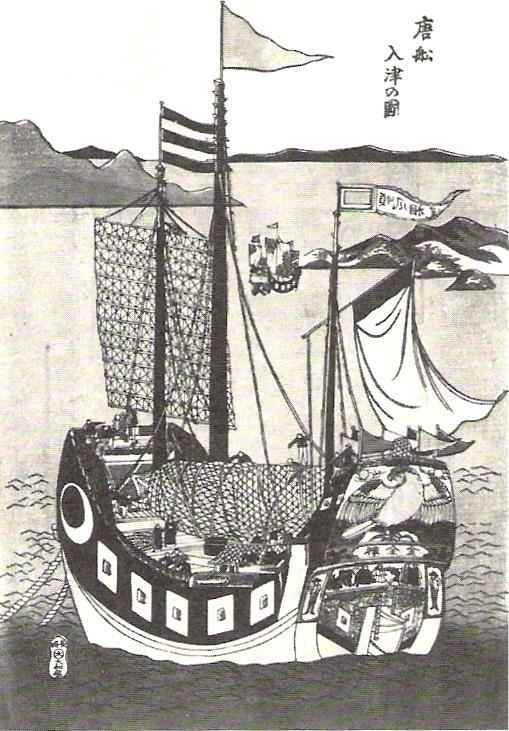
The Manhattan takes on provisions: two cords of wood, two sacks of wheat, 20 sacks of rice, some flour, 11 sacks of sweet potatoes, 50 fowl, 10 pounds of tea and some radishes. The Japanese refuse any payment for the stores, ask them to leave as soon as possible, and politely but firmly admonish them to never return. From Captain Cooper's log: "The Emperor sends his compliments to me and thanks me for picking up their men and sends me word that I must not come again." (Cullen, Craig)
[See: Countdown to Infamy: Timeline to Pearl Harbor.]1863 Birth: Leopold Graf Berchtold: Austro-Hungarian foreign minister at the outbreak of the First World War. Mainly by arguing that Russia would not come to Serbia's aid, Berchtold persuaded the reluctant Emperor to issue an unacceptable ultimatum to Serbia on July 23 1914, which was effectively the first step towards war. Berchtold disregarded Serbia's largely compliant reply and persuaded Franz-Josef to declare war on July 28. With war underway, Berchtold's performance was viewed as somewhat defeatist. Faced with Italian demands for control over certain southern Austrian territories, Berchtold recommended either a declaration of war on Italy (a course of action favored by Army Chief of Staff Conrad von Hoetzendorf and Prime Minister Tisza) or else acceptance of most of with the Italian demands. Forced to resign on January 13, 1915, Berchtold was replaced as foreign minister by the more pugnacious Baron Istvan Burian. Although he took no further part in public life, Count Leopold von Berchtold maintained a prominent role at court. He died on November 21, 1942 near Csepreg, Hungary.
1874 Birth: Oskar Ernst Bernhardt: German author best known for the Grail Message. Perhaps due to the book's focus on individualism and human free will he was labeled a "dangerous" element by the Nazi authorities and exiled from Austria in 1938. He was kept under surveillance until his death in 1941.

1915 World War I: Various:
List Regiment: Gefreiter Adolf Hitler's 16 Reserve Infantry Regiment occupy a position, at Fromelles (pictured above in a drawing by Hitler), which is on a level field with water channels, willow trees and willow stalks, in the distance towards the enemy lines lie an insignificant wood with barbed wire entanglements. Under the direction of their defense-minded commander, Lieutenant General Gustav Scanzoni von Lichtenfels, the regiment works ceaselessly day and night in the subsequent weeks, to further fortify their position at Fromelles. [For further details, Click here.]
Germans shoot down French pilot Roland Garros: On this day in 1915, a member of the German Bahnschutzwache, or Railway Protection Guard, shoots down the well-known French airman Roland Garros in his flight over German positions in Flanders, France, on a bombing raid. [For further details, Click here.]
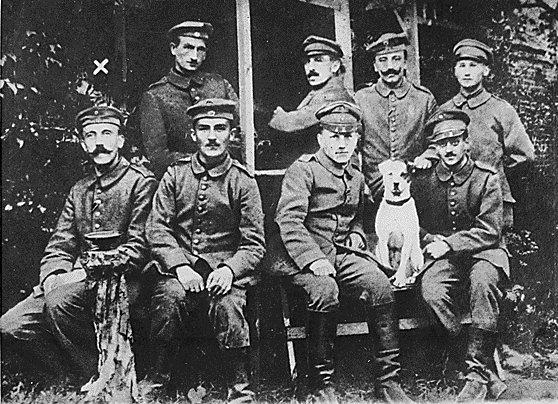
1916 World War I: Various:
List Regiment: Gefreiter Adolf Hitler endures trench warfare in Flanders (Artois) with 3 Company, 16 Reserve Infantry Regiment. [For further details, Click here.]
Turkey: General Yudenich captures Trebizond (Trabzon), facilitating Russian logistical support.
US Ultimatum to Germany Regarding Unrestricted U-Boat Warfare:
On the 24th of March, 1916, at about 2.50 o'clock in the afternoon, the unarmed steamer Sussex, with 325 or more passengers on board, among whom were a number of American citizens, was torpedoed while crossing from Folkestone to Dieppe. The Sussex had never been armed; was a vessel known to be habitually used only for the conveyance of passengers across the English Channel; and was not following the route taken by troop ships or supply ships. About eighty of her passengers, non-combatants of all ages and sexes, including citizens of the United States, were killed or injured. A careful, detailed, and scrupulously impartial investigation by naval and military officers of the United States has conclusively established the fact that the Sussex was torpedoed without warning or summons to surrender, and that the torpedo by which she was struck was of German manufacture.
1917 World War I: Various:
List Regiment: Gefreiter Adolf Hitler's 16 Reserve Infantry Regiment, 3 Company, fortify trenches near Arras. [For further details, Click here.]
Click here for the April 18, 1917 issue of the superior American periodical The Outlook, featuring many articles relating to the War by the finest jounalists and commentators of the day.
1918 World War I: List Regiment: Gefreiter Adolf Hitler's 16th RIR constructs fortified works in difficult defensive positions on an active front with German assault regiments near Fountaine (Montdidier). [For further details, Click here.]
1922 Hitler expounds on the Treaty of Rapallo: "The annihilation of the two national states, Germany and Russia, has been achieved; the Jewish state is already established . . . . Genoa means the continuing enslavement of Germany . . . . Who is representing Germany on Genoa? Her destroyers!"
1923 Poland annexes Central Lithuania.
1933 Church and Reich: Pacelli and Pope Pius XI have a lengthy conversation about the concordat with Nazi Germany. In the evening, Franz von Papen leaves for Berlin. (THP)
1938 Superman--created by Jerry Siegel and Joe Shuster--makes his debut in Action Comics #1. [To see how he brings WWII to an end, click here.]
1939 Romania: In Berlin, Hitler warns Grigore Gafencu, Romania's new Foreign Minister that "Romania will be abandoned by the covetousness of its neighbors" and again offers military aid and support against Soviet aggression.
1941 World War II: Remnants of Yugoslav armies capitulate. Germans pursue their offensive in Greece against Anglo-Greek armies. In Libya, German motorized divisions reach the Egyptian border.
1942 World War II: Various:
Pierre Laval becomes Prime Minister of Vichy France.
Holocaust: 909 Jews are deported from Ceske Budejovice in Bohemia to Izbica and Belzec. (THP)
Doolittle leads air raid on Tokyo:
On this day in 1942, 16 American B-25 bombers, launched from the aircraft carrier USS Hornet 650 miles east of Japan and commanded by Lieutenant Colonel James H. Doolittle, attack the Japanese mainland.
The now-famous Tokyo Raid did little real damage to Japan (wartime Premier Hideki Tojo was inspecting military bases during the raid; one B-25 came so close, Tojo could see the pilot, though the American bomber never fired a shot)—but it did hurt the Japanese government's prestige. Believing the air raid had been launched from Midway Island, approval was given to Admiral Isoroku Yamamoto's plans for an attack on Midway—which would also damage Japanese "prestige." Doolittle was eventually awarded the Congressional Medal of Honor.
A book describing the raid, 30 Seconds Over Tokyo by Ted Lawson, was adapted into a film starring Spencer Tracy in 1944. (History.com)
1943 World War II: Various:
Katyn: The Soviets make an announcement on the murders in the Katyn Forest, claiming that the Germans have concocted the entire story.
Admiral Yamamato is killed when his airplane is intercepted and shot down by American P-38 fighters over Bougainville.
To boost morale following Guadalcanal, Yamamoto decided to make an inspection tour throughout the South Pacific. In April 1943, U.S. intelligence intercepted and decrypted reports of the tour. Sixteen American P-38 aircraft of the 339th Fighter Squadron, US Army Major John W. Mitchell commanding, flew from Henderson Field, Guadalcanal to ambush Yamamoto in the air. In the early morning of April 18, his G4M "Betty" transport aircraft was shot down near Kahili in Bougainville; Yamamoto was apparently killed in the air by a machine-gun bullet which struck his head. [For further details, Click here.]
1944 World War II: FDR and Churchill to Stalin:
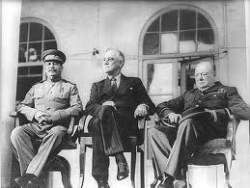
Pursuant to our talks at Tehran, the general crossing of the sea will take place around "R" date, which Generals Deane and Burrows have recently been directed to give to the Soviet General Staff. We shall be acting at our fullest strength. We are launching an offensive on the Italian mainland at maximum strength about mid-May. Since Tehran your armies have been gaining a magnificent series of victories for the common cause. Even in the month when you thought they would not be active they have gained these great victories. We send you our very best wishes and trust that your armies and ours, operating in unison in accordance with our Tehran agreement, will crush the Hitlerites.
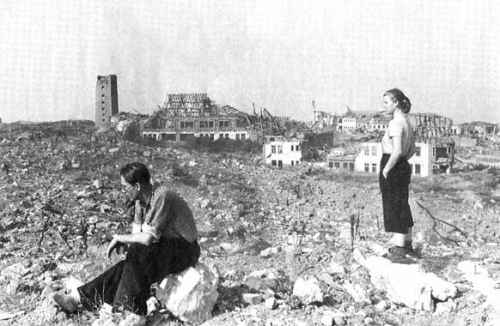
1945 World War II: Various:
Heligoland: Over 1,000 Allied bombers attack the teeny little island of Heligoland, Germany, leaving nothing standing.
Churchill to Truman:
Your armies soon, and presently ours, may come into contact with the Soviet forces . . . . But the moment V.E. Day has occurred we should try to set up the Allied Control Commission in Berlin and should insist upon a fair distribution of the food produced in Germany between all parts of Germany. As it stands at present the Russian occupational zone has the smallest proportion of people and grows by far the largest proportion of food, the Americans have a not very satisfactory proportion of food to conquered population, and we poor British are to take over all the ruined Ruhr and large manufacturing districts, which are, like ourselves, in normal times large importers of food. I suggest that this tiresome question should be settled in Berlin by the Allied Control Commission before we move from the tactical positions we have at present achieved. The Russian idea of taking these immense food supplies out of the producing areas of Germany to feed themselves is very natural, but I contend that the feeding of the German population must be treated as a whole and that the supplies must be divided pro rata between the occupational zones. I should be most grateful if you would let me have your views on these points, which, from the information I receive from many sources, are of the highest consequence and urgency.
Last Days:The remaining German forces in the Ruhr pocket surrender. Himmler names Kaltenbrunner Commander in Chief of all German forces remaining in southern Europe.
[See: The Last Days of the Third Reich.]Field Marshal Walther Model commits suicide:
Walther Model (pronounced "mowdell") was a German general, and later a Field Marshal, during World War II. He was noted for his defensive skills, and was nicknamed "Hitler's fireman." Model served as an infantry officer in World War I. During the Polish and French campaigns in 1939 and 1940 he served as a corps and army chief of staff. In the Russian campaign from 1941 until 1944 he served in succession as a division, corps, and army commander. Model in January 1944 was assigned as commander in chief of Army Group North on the Eastern Front. In mid-August 1944 he was transferred to the west as Commander in Chief West and concurrently as commander in chief of Army Group B. Upon Rundstedt's return as Commander in Chief West in early September 1944, Model retained command of Army Group B, a post he kept until the final dissolution of Army Group B in April 1945. Model committed suicide rather than be captured by the Allies. He is buried in the German military cemetery "Der Soldatenfriedhof Vossenack", located near the town of Vossenack, Germany. [For further details, Click here.]
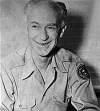
Death: Ernie Pyle: America's most popular war correspondent, is killed by Japanese machine-gun fire on the island of Ie Shima in the Pacific. Pyle, born in Dana, Indiana, first began writing a column for the Scripps-Howard newspaper chain in 1935. Eventually syndicated to some 200 US newspapers, Pyle's column, which related the lives and hopes of typical citizens, captured America's affection. In 1942, after the United States entered World War II, Pyle went overseas as a war correspondent. He covered the North Africa campaign, the invasions of Sicily and Italy, and on 7 June 1944, went ashore at Normandy the day after Allied forces landed. Pyle, who always wrote about the experiences of enlisted men rather than the battles they participated in, described the D-Day scene: "It was a lovely day for strolling along the seashore. Men were sleeping on the sand, some of them sleeping forever. Men were floating in the water, but they didn't know they were in the water, for they were dead." The same year, he was awarded the Pulitzer Prize for distinguished correspondence and in 1945 traveled to the Pacific to cover the war against Japan. On this day, Ernie Pyle is killed by enemy fire on the island of Ie Shima. Worrying more about his Army buddies than himself, he doesn't take cover but turns to ask if they are OK while under Japanese sniper fire. He takes a bullet in the left temple. A memorial on the site where Ernest T. Pyle was killed reads, "At this spot the 77th Infantry Division lost a buddy. Ernie Pyle 18 April 1945". Originally buried on the island, his remains now lie at the National Memorial Cemetery of the Pacific in Punchbowl Crater on Oahu, Hawaii. Pyle will be awarded the Purple Heart posthumously. After his death, President Harry S. Truman will speak of how Pyle "told the story of the American fighting man as the American fighting men wanted it told."
1946 Various:
Nuremberg Tribunal: Hans Frank testifies on his own behalf:

I learned that the Dachau concentration camp was being established in connection with a report which came to me from the Senior Public Prosecutor's Office in Munich on the occasion of the killing of the Munich attorney, Dr. Strauss. This Public Prosecutor's Office complained to me, after I had given them orders to investigate the killing, that the SS had refused them admission to the Dachau concentration camp. Thereupon I had Reich Governor, General Von Epp, call a meeting where I produced the files regarding this killing and pointed out the illegality of such an action on the part of the SS and stated that so far representatives from the German Public Prosecutor's Office had always been able to investigate any death which evoked a suspicion that a crime had been committed and that I had not become aware so far of any departure from this principle in the Reich. After that I continued protesting against this method to Dr. Gaertner, the Reich Minister of Justice and at the same time Attorney General. I pointed out that this meant the beginning of a development which threatened the legal system in an alarming manner. At Heinrich Himmler's request Adolf Hitler intervened personally in this matter, and he used his power to quash any legal proceedings. The proceedings were ordered to be quashed. I handed in my resignation as Minister of Justice, but it was not accepted. [For Frank's full testimony, Click here.]
From Justice at Nuremberg by Robert E. Conot:On the surface, there was a stark difference between Frank and the defendants who had preceded him. He was the first of the accused to reject and denounce Hitler. He had Goering's cunning and intelligence, and Hitler's ability to assess an audience and play to it. While Keitel and Rosenberg had sat rigidly in the witness box and Kaltenbrunner had crouched tensely, Frank seemed relaxed, his keen black eyes scanning the entire room. Lawrence had made it clear during Rosenberg's appearance, chiding prosecution and defense alike, that the tribunal was tired of prolixity, repetition, and irrelevancies; so Frank answered questions fairly succinctly. Beyond and beneath his sense of theater, however, Frank was only marginally different from the others. Forced into speaking the truth by the twelve thousand pages of his journal, he nevertheless resorted to mendacity whenever he thought ho would not get caught . . . .
Frank's testimony precipitated a storm of dissension among his fellow defendants. 'According to your diary, you damned well knew what was happening! It would have been more honorable to say so, and not try to hide among the millions of our nation whom you are trying to burden with a thousand years of guilt,' Fritzsche accosted him when he returned from the stand.
League of Nations: The final meeting of the League of Nations took place on 18 April 1946 in Geneva. Delegates from 34 nations attended the assembly. This session concerned itself with liquidating the League: it transferred assets worth approximately $22,000,000 (U.S.) in 1946, (including the Palace of Peace and the League's archives) to the UN, returned reserve funds to the nations that had supplied them, and settled the debts of the League. [For further information, click here.]
1947 Death: Josef Tiso:
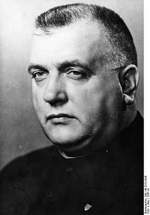
Roman Catholic priest who became a deputy of the Czechoslovak parliament, a member of the Czechoslovak government, and finally the President of Independent Slovak Republic from 1939-1945, allied with Nazi Germany. Tiso lost power when the Soviet Army conquered the last parts of western Slovakia in April 1945. He faced a charge of "internal treason, treason of the Slovak National Uprising and collaboration with Nazism". On April 15, 1947, the National court (Narodny sud) sentenced him to death. Only president Edvard Benes had the power to grant a reprieve. However, despite broad Slovak public opinion and the intervention of the Slovak Democratic Party, as well as a vote in the Czechoslovak cabinet against execution, he refused to grant Tiso amnesty, and Jozef Tiso is hanged this day.
1955 Death: Albert Einstein:
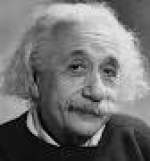
German-born American theoretical physicist who won a Nobel Prize in 1921 for his explanation of the photoelectric effect, at the age of 76. His specific and general theories of relativity revolutionized modern thought on the nature of space and time and formed a theoretical base for the exploitation of atomic energy.
When Adolf Hitler came to power in January 1933, Einstein was a guest professor at Princeton University, a position which he took in December 1932, after an invitation from the American educator, Abraham Flexner. In 1933, the Nazis passed "The Law of the Restoration of the Civil Service" which forced all Jewish university professors out of their jobs, and throughout the 1930's a campaign to label Einstein's work as "Jewish physics" in contrast with "German" or "Aryan physics" was led by Nobel laureates Philipp Lenard and Johannes Stark. With the assistance of the SS, the Deutsche Physik supporters worked to publish pamphlets and textbooks denigrating Einstein's theories and attempted to politically blacklist German physicists who taught them, notably Werner Heisenberg. Einstein renounced his Prussian citizenship and stayed in the United States, where he was given permanent residency. He accepted a position at the newly founded Institute for Advanced Study in Princeton Township, New Jersey. He became an American citizen in 1940, though he still retained Swiss citizenship. In 1939, under the encouragement of Szilard, Einstein sent a letter to President Franklin Delano Roosevelt urging the study of nuclear fission for military purposes, under fears that the Nazi government would be first to develop atomic weapons. Roosevelt started a small investigation into the matter which eventually became the massive Manhattan Project. Einstein himself did not work on the bomb. [For further details, Click here.]
1956 Wunderwaffen: Nikita Khrushchev accompanies Soviet leader Bulganin on a state visit to Great Britain.
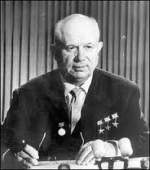
Khrushchev:
Macmillan, Lloyd, and some influential Conservative politicians joined us for supper. Eden's wife was the hostess . . . . During dinner, Mrs. Eden asked us, "Tell me, what sort of missiles do you have? Will they fly a long way?" "Yes," I said, "they have a very long range. They could easily reach your island and quite a bit farther." She bite her tongue. It was a little bit rude of me to have answered her as I had. Perhaps she took it as some sort of threat. We certainly didn't mean to threaten anyone. We were simply trying to remind other countries that we were powerful and deserved respect, and that we wouldn't tolerate being talked to in the language of ultimatums. (Crankshaw II)
[See: Wunderwaffen: Hitler's Deception and the History of Rocketry.]1958 Federal court decides to release Ezra Pound:
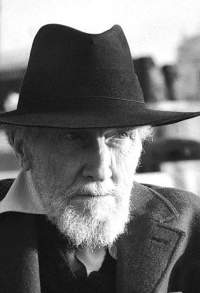
A federal court rules that Ezra Pound should no longer be held at St. Elizabeth's Hospital for the criminally insane in Washington, D.C. Pound has been held for 13 years, following his arrest in Italy during World War II on charges of treason.
Pound was born in Hailey, Idaho, and grew up in a suburb near Philadelphia, where his father worked at the U.S. Mint. He attended the University of Pennsylvania, where he met William Carlos Williams and had a romance with Hilda Doolittle, later known as the poet H.D. He earned a master's degree in languages from the University of Pennsylvania in 1906.
He took a job teaching at Wabash College in Indiana but lost it after six months, having been accused of hosting a woman in his room overnight. In 1908, Pound moved to London, where he taught and published reviews. While working as secretary to William Butler Yeats, he met the daughter of one of Yeats' friends, Dorothy Shakespear, who he married in 1914. The couple later had a child.
During this time, he wrote important works of literary criticism, spelling out the rules for new forms of poetry. He championed young writers such as William Carlos Williams, H.D., T.S. Eliot, James Joyce, Robert Frost, Ernest Hemingway, and Marianne Moore. He also began writing his own poems, including his 116 Cantos, which combined his memories, feelings, impressions, and fragments of literature.
In 1920, Pound and his family moved to Paris, where he fell in love with violinist Olga Rudge, with whom he also had child. In 1925, he and his wife moved to Rapallo, Italy. Pound spent the summers with Rudge in Venice until World War II broke out; Rudge then joined Pound and his wife in Rapallo.
Pound strongly supported Benito Mussolini, believing that art flourishes under strong leaders. He worked actively against the Allies until the end of the war, when he was arrested by U.S. forces and held for weeks in an open cage in a prison camp near Pisa. The experience broke his mental health, although he produced one of his most beautiful works, the Pisan Cantos, there. When he was returned to the U.S., he was ruled unfit to stand trial and held at St. Elizabeth's for 13 years. While in prison, his Pisan Cantos (1948) won an award from the Library of Congress. Poets and authors rallied around him and finally gained his release in 1958. He returned to Italy, where he lived until his death in 1972. (History.com)
1988 Holocaust:
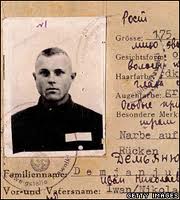
An Israeli court convicts John Demjanjuk of Nazi war crimes, alleging that he was the gas chamber operator, Ivan The Terrible, at the Treblinka death camp in World War II.
[See: Can We, and Should We, Try to Explain the Holocaust?]Edited by Levi Bookin (Copy editor) Click to join 3rdReichStudies Please note that the list-owner and the moderator are not responsible for, and do not necessarily approve of, the random ads placed on our pages by our web server. They are, unfortunately, the price one pays for a 'free' website. FAIR USE NOTICE: This site may contain copyrighted material the use of which has not always been specifically authorized by the copyright owner. We are making such material available in our efforts to advance understanding of historical, political, human rights, economic, democracy, scientific, environmental, and social justice issues, etc. We believe this constitutes a 'fair use' of any such copyrighted material as provided for in section 107 of the US Copyright Law. In accordance with Title 17 U.S.C. Section 107, the material on this site is distributed without profit to those who have expressed a prior interest in receiving the included information for research and educational purposes. If you wish to use copyrighted material from this site for purposes of your own that go beyond 'fair use', you must obtain permission from the copyright owner.
levi.bookin@gmail.com







